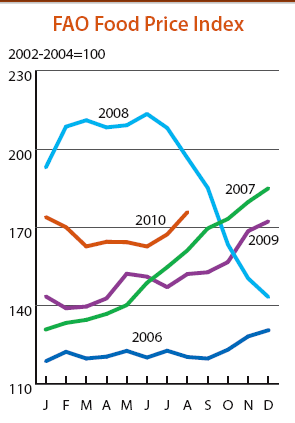On Tuesday, Mozambique’s government announced that it will begin to subsidize bread prices, after bread prices had risen 22% in the previous month.
The move was forced by massive food riots and looting that occurred in the last few days, killing 13, according to Independent Online (S. Africa). This appears to have pacified the Mozambique rioters, although if you believe the Socialist Workers Party, expect worker uprising across southern Africa.

The Mozambique situation reminded U.N. officials of 2008, when spiking worldwide food prices resulted in riots and violence around the world. In a press release, the United Nations warned of “renewed instability in global food markets,” but quotes a human rights official as saying that the market fundamentals are “sound and very different” from two to three years ago.
He added, “So as regards the overall supply and demand situation there’s no cause to worry. The picture could, however, change if there is another shock to supply – for example, due to more bad weather, or if government policies lead to increased anxiety in the market, provoking panic buying.”
Nonetheless, food prices around the world have been surging, according to the UN Food and Agriculture Organization (FAO). According to the latest report (PDF), the jump in wheat prices is the main driver for the increase in food prices in August.
As you can see from the above graph, food prices in 2010 are already well above levels in 2006 and 2009, and are threatening to surpass the major food price crisis that occurred in 2008.
The recent jump in wheat prices was triggered mainly by the Russian once-in-a-century drought and wildfires that have been occurring for several months, causing Russia’s wheat crop yield to fall significantly. Initially, Russia announced that it would ban exports until the end of 2010, but now Russian Prime Minister Vladimir Putin has announced that the export ban will remain in place until the end of 2011, according to the International Business Times.
The UN has called for an international meeting on September 24 to discuss the problem, though it’s not clear to me how a meeting will solve the wheat shortages.
Tension is growing in countries around the world because of the rise in food prices, and it’s feared that food riots will occur around the world, as happened in 2008.
The floods in Pakistan have also contributed to the food price surge. With 20% of the country covered by floods, many wheat crops and seed stocks have been destroyed, and instability is growing within the country. Movie actress Angelina Jolie, speaking at a press conference in Islamabad, was quoted by AFP as urging people to put aside accusations of government corruption and donate money for food and other aid.
 Angelina Jolie at a press conference in Islamabad
Angelina Jolie at a press conference in Islamabad
In Venezuela, our good friend President Hugo Chávez is introducing the “Good Life Card,” according to the Miama Herald. “It’s a card for you to purchase what you are going to take and they keep deducting,” according to Chávez. “It’s to buy what you need, not to promote communism, but to buy what just what you need.”
However, the card appears to be a like a food-rationing technique used by the Cubans. The card would restrict the types and amounts of food that Venezuelans could buy, and could be used to control the entire distribution and supply chain. Many consumer goods in Venezuela have become scarce because Chávez has nationalized many companies, and then operated them poorly. Chávez got away with this when times were good, but the rise in food prices is now causing unrest.
Even Russia is experiencing food shortages, even though there should be enough wheat, since the country has banned wheat exports. Wheat cannot be found in store shelves in Russia, according to the NY Times, causing Russian officials to fear political instability. They’re blaming the shortage on panic buying, hoarding, and speculators.
From the point of view of Generational Dynamics, this food crisis is entirely predictable, and will only grow worse.
I first started writing about rising food prices in 2004, with “Food: Green revolution v Malthus effect.” In 2005, I wrote “Food prices continue to increase dramatically around the world,” that showed that food prices had been falling for decades, but had started to rise much faster than inflation in the year 2000.
The “Malthus effect” is my name for the fact that the population grows faster than the food supply. In a book called An Essay on the Principle of Population published in England in 1798, Thomas Roberts Malthus reached exactly that conclusion.
Malthus made some math errors, but his conclusion is basically correct. Malthus also made some social errors. He said that the inevitable result of food shortages would be famines and deaths from starvation. That might be true for “dumb” animals, but societies of “intelligent” human beings do not simply starve to death. Instead, they have food riots, and eventually resort to war to exterminate their neighbors and get their resources, including farmland. That’s built in to the human DNA.
Some politicians make the claim that Malthus’ predictions have proven untrue, a claim that I consider bizarre when you consider that you can pick any day of any year and there are 10-40 wars going on in the world.
My own rough estimate is that food production grows by 0.96% per year, while population growth exceeds 1.7% per year (since 1950), and is 2-4% in some countries. (However, the United States population has been growing around 0.92% per year.)
To bring the amount of food per capita back to 1950 levels would require the elimination of some two billion people. That’s why I’ve been using the figure two billion as the estimated number of deaths that will occur in the coming Clash of Civilizations world war. This result is mathematically unstoppable, despite the protestations of politicians and college professors who seek money, in the name of fighting starvation and poverty, for their committees, their pet projects, and their personal bank accounts.
COMMENTS
Please let us know if you're having issues with commenting.